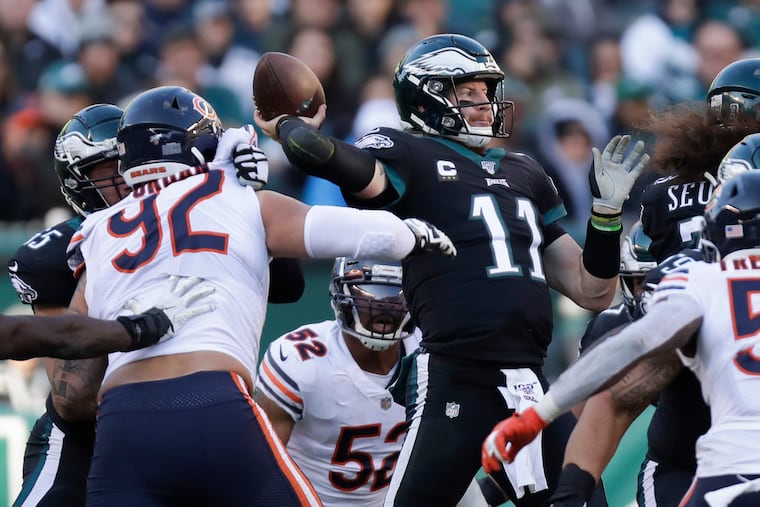Carson Wentz made the big plays in the Eagles’ win over the Bears. Nothing else matters. | Mike Sielski
His four third-down completions on a crucial fourth-quarter drive answered the key question for any quarterback: Did you do what had to be done to win?

The best throw that Carson Wentz made Sunday didn’t matter. That’s the best you can say about it. It didn’t matter.
The Eagles were leading by five early in the fourth quarter, and they were starting to wobble after the Bears had scored two quick touchdowns. And now it was third-and-11 on the Eagles’ 25-yard line, and there was Bears linebacker Roquan Smith charging after Wentz on a blitz, and Jordan Howard cracking Smith with a block, and Wentz leaning and backpedaling and still firing the football on a line over the middle, hitting Alshon Jeffery dead between the 1 and the 7 on his chest, a certain first down if Jeffery catches the ball — which he didn’t.
The result of the throw didn’t matter. Maybe that’s the better way to put it. The drop was Jeffery’s third of the game, and if the Eagles had burped up that 19-point lead and collapsed and lost to Mitchell Trubisky and the Bears … hell, yes, the result of the throw would have mattered.
But the Eagles did not collapse. They won, 22-14, and one of the reasons they did, maybe the primary reason, was what Wentz and coach Doug Pederson did throughout the offense’s next possession: a 16-play, 69-yard drive that ended with a Jake Elliott field goal.
Four times, Pederson asked Wentz to throw on third down on that drive. Four times, if Wentz didn’t complete the pass for a first down, the Eagles would have had to punt. Four times, he did.
Isn’t that as good a way as any to measure a quarterback’s performance on a given day? Wentz did not torch the Bears defense Sunday, just as he didn’t torch the Buffalo Bills’ the previous Sunday. But the Eagles had buried the Bills with an 83-yard, eight-minute march in the fourth quarter, and they did something similar Sunday, and those defenses, the Bills’ and the Bears', ranked third and fourth, respectively, in the NFL. So you can hardly say Wentz didn’t deliver in important spots against formidable opponents.
His statistics Sunday didn’t knock anyone over: 26-for-39, 239 yards, one touchdown. But when it would come for him to review the game film and grade himself, wouldn’t those four completions on that late drive — with the game in the balance — carry more weight than anything else?
“That’s a very deep question there,” Wentz said. “There are levels to that. Coming out of the game, you just kind of want to critique everything. There are throws I left out there early in the game, late in the game, plays we left out there as an offense. But at the end of the day, being able to sustain that drive, that’s what we have to do. That’s what good football teams, good offenses, have to do: stay on the field, convert, grind the clock out like we did.”
They might have done that even earlier, had Jeffery held on to that pass. But as it turned out, that play was merely another indication of the excellence that Wentz has displayed and would display on third down. He was the NFL’s best quarterback on third down in 2017, and it was understandable to think of that success as an outlier. Is that really the kind of thing a team can count on, a quarterback being so good in such important situations?
Except Wentz was that good again in those closing minutes Sunday.
He went back to Jeffery on third-and-3 from the Eagles’ 18, zipping a 13-yard completion to him on a comeback route. On third-and-12 from the 29, he realized the Bears were playing a soft zone, noticed Miles Sanders streaking out of the backfield and into the flat, and feathered the ball to him for 15 yards.
On third-and-3 from the Bears’ 49, he rolled right and hit Zach Ertz for 4 yards. And on third-and-9 from the Bears’ 44, he sold Pederson’s timely play call to perfection, drawing in four pass-rushers before dumping the ball to Dallas Goedert on a middle screen — Goedert rumbling for 16 yards, into field-goal range, to seal the game.
“He’s a very smart individual,” tackle Lane Johnson said. “As the game goes on, I think he picks up on tendencies and stuff like that. He and Doug do a good job communicating with some of the play calls. He goes to what he does in practice, and it’s the same thing.”
Usually, the things that Wentz can’t simulate in practice — breaking from the pocket, throwing across his body, running with the ball himself — are what make him great. This season has been something different. Those improvisational moments, those jazz riffs when he just does what feels natural and ends up taking everyone’s breath away, have occurred less frequently, and they didn’t occur at all Sunday.
His yards-per-attempt average (6.7) is his lowest since his rookie season — and that figure would be higher if the Eagles’ wide receivers weren’t so butter-fingered — but his interception percentage (1.3) is the lowest of his career. He’s taking fewer chances, getting the ball out quicker, trying to stay within the structure of the offense.
There are tradeoffs in playing that style. That final drive Sunday showed the benefits. How do you measure a quarterback? Maybe this way: Did he make you the plays that won you the game? Carson Wentz did. The rest doesn’t matter.